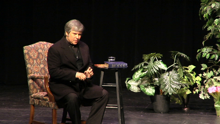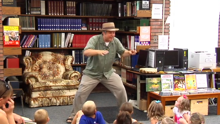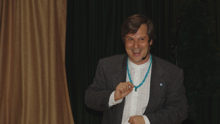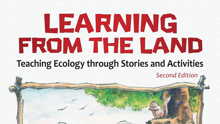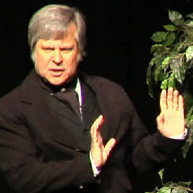There is a growing body of research to affirm what storytellers have long known, oral language development is the first and most important step towards teaching reading and writing. Storytelling is also the thread that ties the curriculum together. This is the basis of much of my work in eductional storytelling. I have written both academic and public interest articles on storytelling as a tool for teaching basic literacy skills, (Follow this link to read a few Articles) Many of the following workshops have been presented at dozens of conferences, in-service workshops and teacher institute days. Please Contact Fox if you would like to host a workshop for your community.
STORYTELLING AND THE READING-WRITING CONNECTION
Learn lessons that stimulate creative writing and a love of reading in the primary classroom. Storytelling helps preliterate students learn story form and story grammar through the writing and telling of original tales. Teachers will learn several stories they can tell ‘on Monday’ as well as several dynamic lessons they can use to help their students develop a love for language.
PLAYING WITH GENRE: Using Oral Language Skills to Improve Reading and Writing
Improving writing scores and reading skills is really about teaching thinking. In this participatory workshop you will use oral language to initiate writing in several genres. We will explore the personal narrative by telling personal stories. We will discuss important ideas and retool the expository essay. And we will engage in lively debate to develop persuasive writing skills.
A TAPESTRY OF TEACHING TALES:
STORYTELLING AND CREATIVE WRITING AS WARP AND WEAVE FOR INTEGRATING THE CURRICULUM
Storytelling can enliven most any topic. Ideas come to life in a tale. Stories can become the warp upon which a teacher weaves the threads of the various content areas. Learn math stories that teach problem solving skills and science stories that make abstract concepts tangible while teaching scientific processes. Learn to tell his-story (and her-story!) in a way that motivates students to want to know more about their past. Most importantly, discover ways to use storytelling and creative writing to tie the curriculum together, to integrate ideas and build thematic units, to introduce concepts and explain important theories, and to stimulate critical thinking.
BIRD IS THE WORD:
Journaling, Poetry, Non-Fiction Writing, and Ornithology
A poet’s eye and gift for language is very similar to the detailed observation and ability to communicate complex ideas required of field ecologists. In this participatory workshop you will learn some tips for effective journaling. You will learn to use haiku to focus your eye and ear. You will learn to use poetry to help you write clearer more exciting essays and turn your field notes into publishable articles. Come to celebrate the voices of nature and find your voice in the natural world.
Mark Twain's River His-story, (and Her-story, too!)
Learn how to conduct oral history interviews to research local history with an emphasis on average folks. Learn library research skills and how to turn "field notes" into dynamic literature. Though we will focus on river history and the context that inspired Samuel Clemens, the skills learned are applicable to any period of history.
Content Area Reading Storytelling:
His-story, Science and Math Stories
Improving basic literacy, reading and writing test scores, by integrating the curriculum is the aim of this participatory workshop. Stories can become the warp upon which a teacher weaves the threads of the various content areas. We listen and speak at a higher level than we can read and write, so it is only natural to use storytelling and listening to teach content. And oral language development is the cornerstone for better reading and writing.
I Tell, We Tell, You Tell:
Oral Language Development, the First Step Towards Teaching Reading and Writing
Within this action packed participatory presentation you will learn at least three stories that you can tell and teach to your students. You will also learn techniques to improve your storytelling skills and teach storytelling to your students. Author and storyteller Brian “Fox” Ellis will highlight the research implications of oral language development as a potent tool in teaching basic literacy in the early childhood setting. Grounding the latest research in literacy education with practical classroom tested ideas, this dynamic workshop will reinvigorate your classroom.
